Temps de lecture 12 min
Report on the week in Brussels.
Cliquez ici pour lire l’article en français.
Brussels’ Grand Place under the sun
TLDR (too long, I didn’t read it) : It was just too much fun ! You can feel that the bonds between participants are getting stronger, and that the methods of popular/permanent/active/new education (place the term of your choice before education) are bearing fruit !
That week, from June 12 to 17, 2023, Brussels was bathed in sunshine.
A crosswalk in LGBT+ colors leading to parliament.
We were two Framasoft members : Fred and Booteille.
In ECHO Network meetings, Mondays and Fridays are dedicated to travel, since the various people are more or less far from the meeting place.
But our Belgian pals had planned a debate evening for Monday evening, so we had to arrive not too late.
Luckily, we both had trains that allowed us to arrive around noon, so we met up at the Gare du… Midi and set off together to explore the city center of the European capital in search of our hotel.
Smurf ceiling in Brussels. Comics are everywhere.
Once we’d packed up, we took a quick stroll to find a place to eat.
Brussels is a great city, where you can go from an upmarket district to a working-class one just by crossing the street. I’m sure that’s true elsewhere, but it struck us. Fred’s tip : if you want to be offered something to smoke, walk around with a guy who looks like Bob Marley.
After that, Fred wandered off while Booteille recuperated from his three nights of 3-4h in a row (he’d just come from another association’s AGM and a few parties).
So we met up directly at the DK workshop, a very nice association bar, where we were going to discuss what Framasoft is with a few dozen members of the public. The invitation had been extended by Tactic (which supports and hosts ethical digital services) and Neutrinet (a Belgian non-profit ISP) ; Tactic being one of the Belgian partners who co-organized some of the activities during our stay in Brussels.
The time, the people and the place were really nice. We were made to feel very welcome, and it was a pleasure to be with so many allies we didn’t know.
A journalist was at the party for a documentary he’s preparing on privacy. He wants to sell it to RTBF. He took video captures of the discussion.
Gerben, who works for NLnet, was there. NLNet is a foundation that funds a lot of digital projects that contribute to improving our society. PeerTube is one of these projects.
On the first evening, we had a meal downtown with the ECHO partners. For Booteille, who was bursting with fatigue, it was particularly difficult to start exchanging in English that evening.
On Tuesday, we kicked off the first day of activities at Maxima, a very nice third-party association.
Everyone had arrived, despite a few people’s transport problems. There were members of Solidar Foundation, CÉMÉA Italy, CÉMÉA France, Willi Eichler Akademy, La Ligue des Familles in Belgium, Tactic, Framasoft…
It’s important to note that the theme of the week was « active education practices to raise awareness of ethical tools ».
So we started by doing some activities to get us into the spirit of the week, to start building links between participants, based – as will be the case for almost all activities – on active/permanent/popular/new education methods ; choose your favorite term among these. While not everyone agreed on the name (and some didn’t necessarily mean the same thing as others), everyone validated their interest, and that’s the important thing !
Next, we got into groups to discuss what we thought active education and popular education were and were not. We had to draw our interpretations on panels. In a few years’ time, our work may be found again, and the world may mistake it for a painting by Leonardo da Vinci. Expect the foundations of what we call « art » to change after that. There will have been a before and an after. :)
After the small-group discussions, we watched a video on Joseph Jacotot, « Peut-on enseigner sans savoir ? » (Can we teach without knowing ?).
We then presented our panels and had a large-group discussion.
In the afternoon, we did an activity based on key digital figures : money, quantity of data, pollution, place the figures given opposite the right question. Not an easy task, even for geeks. Quite a few people made corrections to the figures given after the activity, as the cards were three or four years old. This highlighted the speed at which digital technology is evolving, which is quite staggering.
Then we had a meeting with people from Code du Numérique. An ultra-cool project. They are working to build coherent legislative proposals to put to elected representatives – particularly on issues of inclusion. These proposals are developed through workshops with a wide range of people, both those who are comfortable with digital technology and those who are not. You don’t like legal issues : go and talk to these people !
There are some great videos on their website, which we recommend !
We also suggested that they be interviewed on the Framablog, because we were so enthusiastic about it.
The day ended with a review of the activities carried out. As always with popular education, you get the impression that the hours have just flown by and that you haven’t made any effort, but when you look back you realise how rich the exchanges have been and how much work has been done.
We then went for a drink and a bite to eat with some of the group. And to answer the question on your lips, yes, some people had chips !
The next day, we had a date at another venue, the PianoFabriek, in Saint-Gilles.
We had a beautiful (dance) hall with an outdoor area.
In the morning, Cécile and Annie, from the Ligue des Familles, suggested « the hidden side of clicking » as a theme, where we would discuss the attention economy.
But before that, we played a little presentation game, where each pair had to find something in common that the others didn’t have. Contrary to what you might think, many people have been on roadtrips to Spain and would like to listen to opera.
Annie and Cécile then asked us to answer 12 yes or no questions. These 12 statements are designed to help identify an addiction (see an example here) and have been adapted for use with smartphones. For example : « I feel nervous or anxious if I’ve left my smartphone at home ».
Several people in the group were a little « shocked » by the results of their answers.
Answering two (2 !) of the statements with « yes » underlines addictive behaviour. Suffice it to say that the geeks have hit the roof.
In Belgium, Fred’s addiction to Speculoos is reawakening.
We then watched the Dopamine episode on Facebook, which many people were just discovering, and discussed it with our respective small groups.
The next activity was cognitive bias bingo. The names of several biases and their descriptions were posted around the room, and a randomly selected pair of us were asked to write down the name of the bias for each description on an index card.
After this activity, we discovered Ardoino’s grid in which we had to place, first on our own and then with our groups, solutions to the problems raised by digital technology.
Were these solutions of an individual, interpersonal, group, organizational or institutional nature ? Let’s think about it !
The aim was to highlight the fact that many impactful actions are not just individual matters (you know, peeing, showering, etc.).
We ended our activities at PianoFabriek with a moving debate.
Individually, we wrote answers to « For me, active pedagogy is… » and « For me, active pedagogy is not… » on sticky notes.
After which, Alain, from CÉMÉA Belgium (who co-hosted most of the week with Sarah, also from CÉMÉA Belgium), chose a few answers and had us move around the space to indicate « I agree » or « I disagree ».
Once positioned, we were able to speak up and discuss the reasons for our position. At any moment, we could change our position, physically showing the evolution of our thinking.
We really enjoyed this form of debate.
Incidentally, we haven’t noted it yet, but it’s important to know that we mainly exchanged ideas in English, and translated into English what people who spoke in French were saying. Most people seemed to understand enough English not to translate systematically from English into French, and would indicate when there was a need for translation in that direction.
The translation work was a considerable effort, but for the people in charge of the animation, it was even more exhausting. At the ECHO Network session in Paris, those able to express themselves in English had formed a group which spent the whole week exchanging in that language. In Brussels, this was not possible. European project, European constraints !
After the PianoFabriek, we joined members of EDRI and Technopolice Brussels for an exploratory walk in public spaces (notably the Gare du Midi) in search of CCTV cameras.
These two people helped us to better understand the thinking behind the installation of cameras : « Which locations with which lenses ? » In the Gare du Midi, for example, each door is necessarily equipped with a dedicated camera. There’s also a camera in front of every staircase leading up to the platforms, so that faces can be clearly identified. Not to mention the store, where a camera is also pointed… at the cashier’s hands !
We noticed that there are far more cameras in the poorer neighborhoods (including Molenbeek-Saint-Jean) than in the richer ones. One fact that impressed us : a camera was located in front of a subway station in a working-class neighborhood. Residents didn’t like it, and it was damaged. Another camera was placed much further down the street, but it monitored the same subway exit. These cameras have an impressive zoom capability.
The cost of installing a camera is estimated at €20,000, and cities are installing hundreds of them, although their effectiveness in combating crime has not been proven in the slightest.
The premises of the Belgian Cyber Security Center are packed with surveillance cameras. No, nothing. All is well.
Ha, I think it’s time to ask this but… HOW IS IT THAT IN BRUSSELS YOU HAVE TO PAY FOR BOTTLED WATER IN ALL RESTAURANTS ! NO FREE TAP WATER ! JUST WATER ! RAAAAAAAAAAAAAAAAAAAAAAAAAAH ! LET’S BURN CAPITALISM !
A poster « Are you a communist ? Join us ! » we came across while wandering around Brussels.
Sorry for the outburst, it’s okay now.
For the last day, we were back at Maxima, where a number of digital, image (video) and radio players presented their projects to us, including RadioPanik, a free radio station (which makes fascinating impossible programs) and ZinTV, an organization close to social movements.
After the presentation of their projects, we had a large-group discussion on the difficulties of migrating to open-source solutions for certain structures.
During the day, we had to join either ZinTV to learn how to make video recordings, or RadioPanik to learn how to make radio.
We learned how an ultra-light portable radio transmitter works, or how to use OBS to broadcast live TV.
At the end of the day, there was a PeerTube presentation from someone who learned a little late that she had to do it, poor thing. Luckily, Booteille was on hand to answer any questions.
After that, the ECHO Network core group and I took stock of the week.
The results were really positive. The partners who didn’t really see the value of popular education methods during the first session in Paris are now convinced. The links between the different members and structures were further strengthened.
We had the feeling that we were really starting to form a body, a real group, and that we were all really moving in the same direction, which for a pan-European project like this is really motivating.
In the evening, before dinner, we attended a conference on Tyler Reigeluth‘s book, « The Intelligence of Cities, Critique of Endless Transparency ».
Before the conference, Booteille spoke on behalf of Framasoft alongside Morgane (co-organizer of the ECHO project, member of CÉMÉA France), Sarah (who was co-organizing the trip to Belgium) and Célo (member of Tactic and Neutrinet, who played an important part in organizing the activities), into the microphone of RadioPanik, which was broadcasting live.
We gave a brief presentation of our structures and the ECHO Network project.
The conference then got under way, and to be honest, we weren’t very good at it. Our ECHO Network accomplices, who had learned how to make radio and TV that very afternoon, were broadcasting the conference over the airwaves, and we couldn’t help but give them a helping hand. The PeerTube streaming of the rebroadcast had a problem, and Booteille had to get his hands dirty (Booteille’s note : In truth, they managed just fine without me, haha !).
Right after the conference, we went out to eat, drink and chat until late.
Antonio, our Croatian colleague (from Center for Peace Studies), hosted the evening. He’ll be part of the host team in Zagreb, and he’s quite a character !
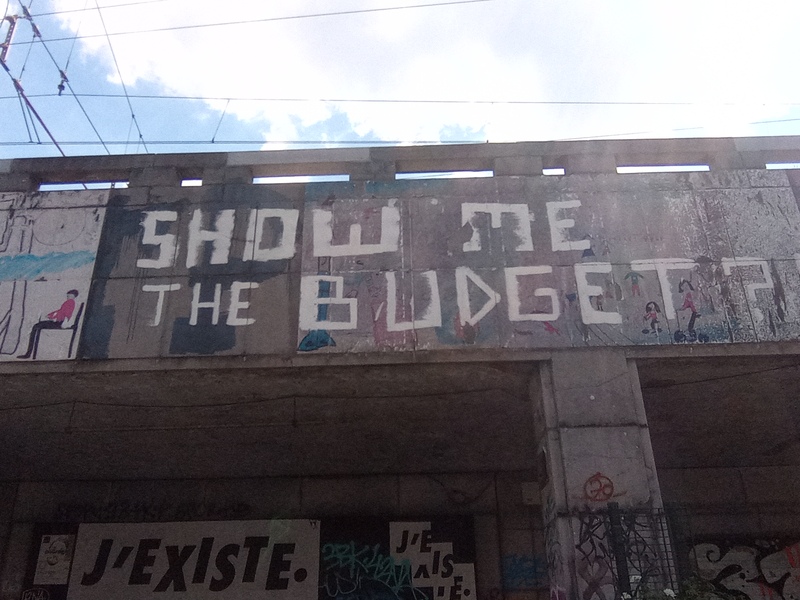
This « Show Me The Budget » graffiti near the Gare du Midi is indisputable proof that pyg has been to Brussels.



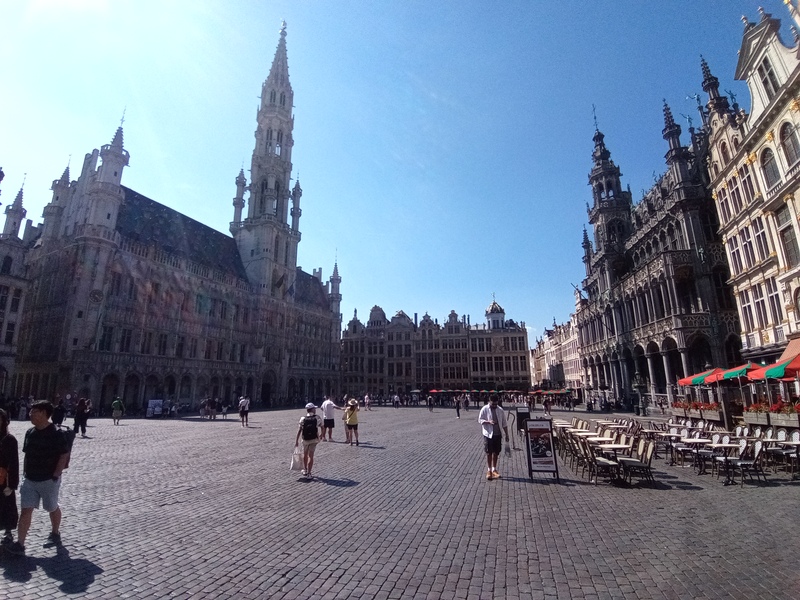
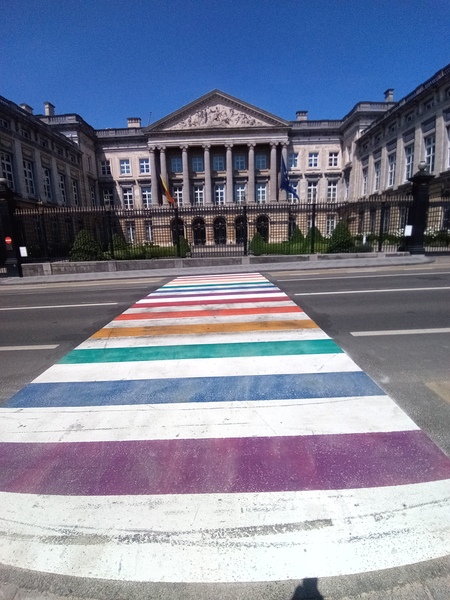
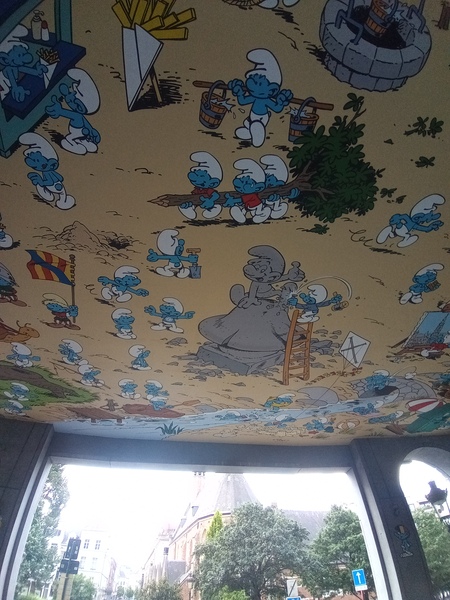
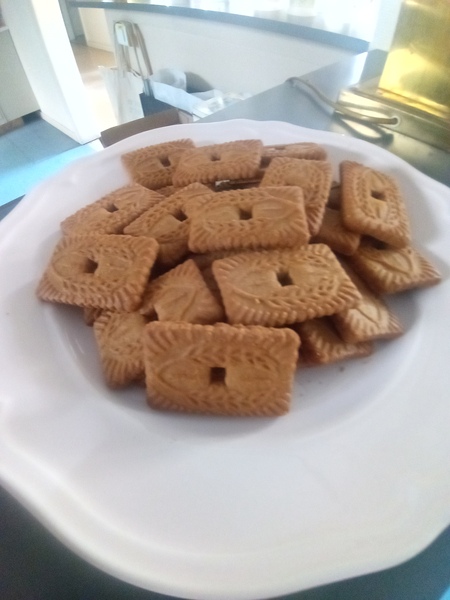
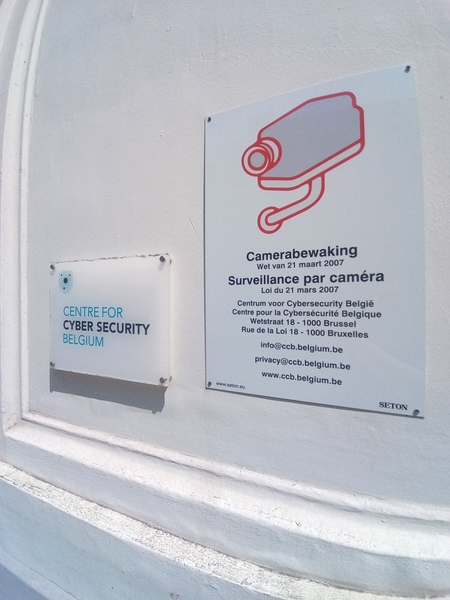
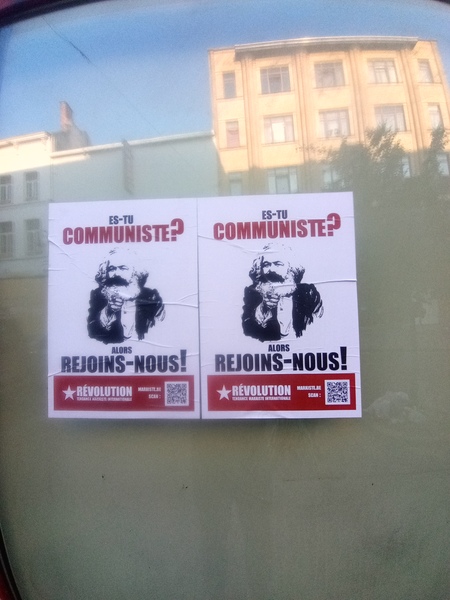
Laisser un commentaire